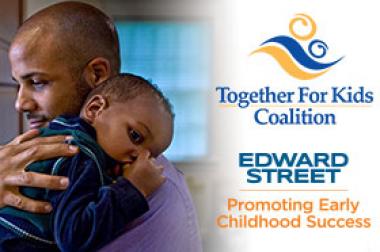
A new mother struggles with postpartum depression.
A single father needs services for his two children, a daughter with cerebral palsy and a son in need of childcare.
Parents of two young children battle substance use disorder.
What do these Central Massachusetts families have in common? They’re either unaware of available support systems, ineligible due to income restrictions, or afraid of being stigmatized as poor or burdensome.
Their young children, meanwhile, could be missing out on key developmental building blocks or, worse, enduring trauma or toxic stress.
The Together for Kids Coalition(link is external) (TFKC), a collaboration of early childhood advocates led by Edward Street, is working on a solution.
Chaired by Edward Street Executive Director Eve Gilmore and managed by Education and Public Health Consultant Dodi Swope, TFKC proposes a fully aligned system linking families with childcare providers, public and private youth services agencies, community leadership, advocacy groups, health care providers, and business leaders.
By working together, the community can prevent serious issues from ever occurring while encouraging healthy development in all young children.
Said Swope, “Early childhood tends to be a scattered, unaligned set of resources that families need to figure out how to navigate, which is further complicated because providers don’t know each other exist. The question is, how can we streamline this for families?”
Seed money for the project was provided through a grant from the Greater Worcester Community Foundation’s Worcester Together: Central Massachusetts COVID-19 Fund.(link is external) The fund sought novel ways to reimagine family, business, and community life in Central Massachusetts in the wake of the pandemic.
TFKC’s proposal hinges on universal, available screenings and age-level benchmarks – At years one, three and five, every Worcester child thrives, in TFKC’s parlance. By widening family eligibility, the coalition hopes to eliminate the stigma associated with accepting help and increase engagement across all income levels.
(The COVID-19 pandemic, which temporarily loosened income-based restrictions, has revealed significant need among ineligible families.)
If necessary, families would be referred to services for physical or mental health, toxic stress or trauma, employment, childcare, housing, nutrition, or transportation.
“Early childhood is the most important period of a person’s development and we do it in such a haphazard way,” added Swope. “It deserves a fully thought-out, integrated system where families only need to say, ‘I need X,’ and there’s a system that responds.”
Since no such system currently exists in Worcester, or anywhere else in Massachusetts, its implementation would be groundbreaking. One day, it may even be seen as revolutionary.
After all, the entire community stands to benefit. Effective support in early childhood has the potential to build a larger, more qualified workforce, bolster individual and family earning potential, and reduce spending on costly, and less effective, remedial services.
“In Worcester we like to say we’re a city on a rise,” noted Swope, “and part of that should be that it’s a great place to raise kids, with green spaces, family support, and resources, and where businesses will support you as a working adult.”
To learn more about the Together For Kids Coalition, visit www.togetherforkidscoalition.org(link is external) or email Dodi Swope at dcswope@charter.net(link sends e-mail)
.
